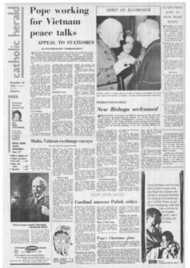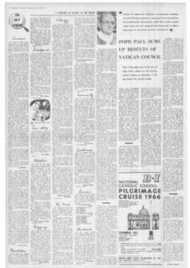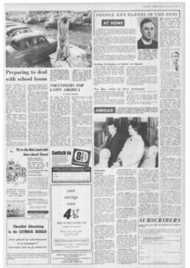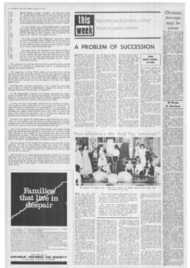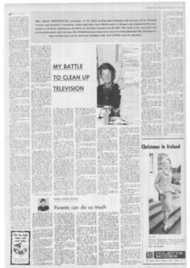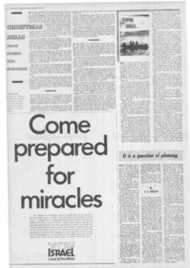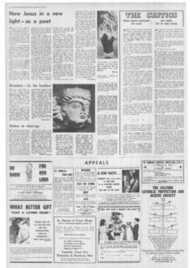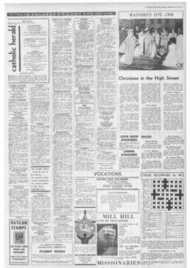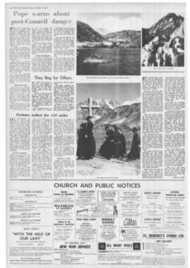Page 5, 24th December 1965
Page 5

Report an error
Noticed an error on this page?If you've noticed an error in this article please click here to report it.
Tags
Share
Related articles
Bbc 'like A Drunken Aunt' Muggeridge
Whitehouse Attacks Tv
David D Oherty Of Th E Broadcasting Research Unit...
Half-baked Remarks On Mrs. Whitehouse
Tv Centre Chief Warns Politicians
MRS. MARY WHITEHOUSE, co-founder of the Clean-up Television Campaign and
secretary of the National Viewers' and Listeners' Association, claims that more than 350,000 people of all ages and religious beliefs have signed a manifesto condemning standards of television broadcast by the BBC. The work of her movement has received both praise and criticism. Mrs. Whitehouse says many of her views have been distorted. The following is a tape-recorded interview in which our television critic, IAN JAMES, asks the questions.
MY BATTLE TO CLEAN UP TELEVISION
HOW did it all begin?
AS A PARENT I had been disturbed for a number of year about developing trends in television. As a teacher. more so, because although I was aware that one could always turn off the television--incidentally I don't believe that is the answer — I was constantly meeting children from homes where parents did not turn the television off. Even so there is the important point that children cannot be insulated against television even if it turned off.
I began to be more and more conscious of the quite specific effect certain programmes were having not only on the thinking but also on the behaviour of children and this is when I began to take some action.
What sort of programmes and at what time of the day?
FOR INSTANCE the "Meeting Point" programmes at this time which were featuring discussions on pre-marital relationships. These were unbalanced discussions — I say that because 1 want to make it clear that I have nothing against discussing pre-marital relationships on television.
Unbalanced.in what way?
I CAN GIVE you an example. In one programme where youngsters were asking questions there was not a single member of the panel who was prepared to say outright that pre-marital relations were wrong. In fact when a girl asked a clergyman "Do you think that fornication is sin", he replied. "It depends on what you mean by sin and what you mean by fornification".
After this one of my girls brought up this programme and she said she knew what was right now . . . she said "I know now it is wrong for me to have intercourse until 1 am engaged".
You say this programme was unbalanced — is that because no ono put the other viewpoint?
YES. This is what is wrong with the BBC. They do not give people who want to put the established Christian viewpoint a chance to say anything.
You believe, therefore. that the BBC loads its programmes 10 conform to the ideas of the new morality?
I HAVE NO DOUBT about that at all.
Is there not a tendency on your part to allow parents to abdicate from their responsibility. For instance in the rase of the girl you mentioned, surely her parents should have been able to say "well this programme didn't put the other side of the case. The people you saw were not representa
tive . this is the real position . . ."
I AGREE with you entirely that basically these things are the responsibility of parents. But you must remember that many parents have not accepted their responsibilities.
Is it fair. then. that you should blame the BBC entirely —I will allow a share of the blame forthe omission Of parents?
THE BBC is to blame because what is said on television has a voice of authority even greater than the voice of the parents. The big hazard present-day children have to face is that so many adults do not stand for anything. In my view the BBC therefore has no option but to come down firmly on the side of Christian values.
You have suggested that in society at large many adults are lacking in a sense of Christian values. Do I take it that in your view the BBC should not reflect society as if is bur as it .should he?
TO A LARGE EXTENT the BBC is responsible for creating the society which it reflects, I do not put all the blame on to the BBC. and I believe people must be responsible for their acts. but it is a fact that as a public service in a Christian country — and I don't say this, the BBC says it itself — it "bases its policy on a positive attitude to Christian values, it seeks to safeguard those values and foster acceptance of them; the whole preponderant weight of its programmes is directed to this end" This is what the BBC has said of itself, but we think there are people at the BBC who are changing this. We contend that they have no mandate from people or Parliament to do so. What we are doing is asking the BBC to do just what it says it will.
You think that the BBC should have a missionary role?
I WOULD NOT have thought that there was any doubt about this. The BBC
has said it is "trustee of the nation". Let me give you an example of the BBC creating the climate which it then justifies its reflection. There was this programme on "24 hours" about contraception clinics. I am not against this subject being discussed on television.
But in this programme they had six girls who came to the microphone, girls from Birmingham College of Technology, therefore the cream of our intellectual youth. They all faced the microphone and with the exception of one girl said they were living promiscuously and they presented the idea that promiscuity is normal among our intellectual youth. There was not one who spoke out in opposition to this. I find it diffi cult to believe that the first six girls the BBC interviewed were actually all promiscuous.
You are suggesting that the BBC selects people to gain efiect?
I THINK it is possible that they do, and I think it is very difficult. In fact I would go this far — I would say if it is true that the first six said this then they should have gone on until they found whether in point of fact those six were indeed typical and whether pretty well 100 per cent of these girls were promiscuous. And a few nights later we had "Up the Junction".
Now we think these programmes reflect a totally inadequate concept of what telesion can do. We think these people are the ones who are reactionary and limited in their thinking. They must take the additional step and say to themselves "If we put on a programme like this what is it going to do to the problem of venereal disease in the country? I know young people . . . there is nothing more difficult in this world for adults, let alone youngsters, than to go against what is shown to be the tide.
Can I go back to the six girls you spoke of? If there is a serious problem in this country about promiscuity, and let us even say that perhaps a majority of students are promiscuous — I use this as an example — is the BBC to reflect this situation accurately with its resulting shock effect and the alarm it will concern or...
BUT WHO ARE YOU ALARMING? The people you are dealing with in this situation are the youngsters. They are the ones for whom you have to produce some kind of new approach. I think this is where the thinking is unrealistic. They (the BBC) still think of themselves as journalism if you like, they still think of themselves as a projection of the stage. They are none of these. They come into our homes with the voice of authority and this is something they cannot possibly escape.
1 feel that the thing that no one has done is thrash out the philosophy that television needs bearing in mind its power to control and manoeuvre the thinking and behaviour, particularly of the growing-up youngsters. i think that the simple straightforward truth that any parent or teacher knows is that the most powerful thing in the world is example.
I would love to know when the BBC have actually put over a programme which built into youngsters the idea that the worthwhile thing is to live clean and straight and not only build into them that idea but actually give them the strength to do it, because if you show youngsters that everyone else is living promiscuously how do you give them what it takes to go against the tide?
Du you believe the BBC should be a propaganda organisation. I see in your manifesto you speak of "the propaganda of disbelief. doubt and dirt that the BBC pours out". Do you believe that the BBC should be a propaganda organisation for the Chrigian way of life?
THE WORD PROPAGANDA is a difficult one. Penry Jones, the Religious Programmes Officer of ITA, said that "all television is religion. The only question is which God does it serve?" I think that is marvellous. I think it is equally true that all television is propaganda. the only question is what ideas does it propagate?
Television is all the time either destroying the ideas which have made Britain what she is or it is building them up. I am not suggesting, however. that these things should not be called into question. I don't believe in censorship. What I am concerned about is that the weight of BBC television is towards the destruction of values and the undermining of them and not for building them up.
Would you define for me the role of the BBC as you see it.
IT IS A PUBLIC SERVICE paid for out of public money. The duty of the BBC is clear. The present tendency of the BBC is towards anarchy. the undermining of authority—of the police. of parents.
The BBC as a public service has to act responsibly. just as the Ministry of Health. and the Home Secretary does. I don't think the BBC can stand on one side and just regret such things as drug-taking. It must act as a public service.
Let me get on to something else. A memorandum has been sent around the BBC departments by the Head of Drama in which he uses a phrase "let's keep our responsibility to the public equal to our responsibility to TV as a creative medium". What is your comment on this?
THIS IS WI-IAT we have been asking for. This is what the public wants. If it can be worked practically it would bring in a whole new era of television. There must be considered thought about what is meant by responsibility to the public.
Du you think this memo has had or will have the effect you want?
IT IS DIFFICULT to say. The first Wednesday play after his memo there were seven "bloodies" in the first five minutes although Mr. Newman had said in his memo that blasphemous words should not be used.
If a play was written around a character who would normally use the word "bloody" do you suggest that he should be made to use another word?
THE ONLY POINT I make is that Mr. Newman said the BBC should not use blasphemy when the English language had an abundance of good crunchy words.
1.5 "bloody" a word you would object to?
THIS COMES BACK to the question of television philosophy. "Bloody" has come to be accepted as a word you can use freely on television. Recently they have started to use "Christ" as an expletive. What I fear is that if you use a word often enough it comes to be accepted as normal conversation in the home. Which is the most important thing to you . . . that a man should be allowed to say "bloody" in order to be authentic or that in millions of homes children are going to hear words which will come into their language?
The greatest part of your criticism of the BBC is concerned with the effect of programmes on the young. Is there not a time during the day when the BBC can speak to an adult audience without fear of offending or getting at young viewers?
THIS WORD ADULT is one that interests me very much. The only thing I see the BBC doing—though they justify it as being for adult audiences—is the kind of sneer and smut you get on BBC3.
Can you give me three or four examples of this sneer and smut?
WELL TAKE FOR INSTANCE the pipe and the Crucifix incident and the whole conversation. This was smutty and contained blasphemy.
That was one programme. Could you name some others?
THERE WAS something else the week before.
But surely does nut the fact that you have to think so hard to find examples suggest that maybe there is not as much sneer and smut as one might be led to believe.
IF I WAS AT HOME with my material I could give you other examples.
But surely you can remember these instances of bad television—or some more examples if they are as frequent as you say?
IT DOESN'T MATTER how many instances there are. The point I am making is that this is not adult viewing but viewing for little boys. If the BBC has to have special times for what they call adult viewing, what sort of men are they?
Surely television is not an open door for children. There must be a place for discussion of topics which are perhaps unsuitable for young viewers?
I WOULD LIKE to see this sort of thing discussed from a mature viewpoint.
Is the BBC not entitled to assume that there are periods in the day when it can talk to intelligent grown-up people?
IT IS EXTRAORDINARILY difficult for parents to exercise a discipline on this. When children are 16, 17, 18 you can't just send them to bed. A lot of youngsters probably those who need help most — tend to be just coming in at that time — late at night I mean. When youngsters are 18, 19, 20 then they are often up after the parents have gone to bed.
Does this mean that the BBC can never broadcast just to adults?
WHAT THE BBC must always remember is that it is going into our homes.
Do you think people use the off-switch enough?
PEOPLE DON'T KNOW they should switch off until it is too late. There is no way to insulate people against what is on television.
Not even the off-switch?
NO. BECAUSE my experience in schools is that if they don't hear it in their own homes then someone else will tell them at school.
But aren't you expecting ton much of the BBC? Must they always consider some child in some home might he watching. Is it not inevitable that there will always be some "casualties" as a result of television.
The BBC is going into every type of home—different levels of intelligence and understanding—and surely there will always be some who cannot or will not understand the real importance of what is being said. Must the BBC have as its measuring stick the most impressionable youngster in the country or can it reach some average point and measure its output by that?
I AGREE with this. I accept that the BBC will make mistakes.
Let me move on to BBC standards. Do you think it possible that one of the reasons why BBC standards have lowered is that they have been put under pressure to get a wider share of the nightly viewers?
IF THE BBC THINKS this they are out of touch with what the public wants.
Do you think you know what the public wants?
YES. WE have more than 350,000 signatures on a petition to show what it wants.
But viewers' research figures would show that the public wants something like "Coronation Street" or "Dr. Finlay". Would you think that a continual diet of this would make good television?
NO, 1 DON'T. The trouble is that there is no choice. The trouble with the BBC is its preoccupation with the negative side of life and not the positiVe.
If they would do the sort of thing we are asking them to do they would produce the kind of television that has not even been dreamed of yet.
Much is said about the bad things the BBC does . . . Will you acknowledge that the BBC also does a lot of good?
SOME of their most questionable programmes have been in the field of documentaries. if that is the sort of thing you mean. Take the programme on Picasso for instance.
/ am talking about its contributions to music, its news coverage ...
WELL we did a two-month monitoring of the BBC last year and we found that over 50 per cent. of what the BBC does is first class.
You never criticise ITV.
WELL, the BBC just cannot be approached. They have constantly refused to listen to us. But the ITA have shown an interest in what we say and I have built up a constant liaison with ITA officials.
Do you think that the ITA authorities take notice of what you say?
YES THEY DO. Let me get this straight. I hold no brief for Independent Television. I don't expect perfection. But whenever we write to the BBC they send a letter back saying that they are sorry we did not like something but other people did, inferring that there must be something wrong with us.
There is this colossal arrogance in the BBC towards us. ITA, however. is prepared to listen and they give the impression that they are prepared to improve gradually. I have come to the conclusion from my post that more and more people are switching to Independent Television.
Mrs. Whitehouse, what does your movement hope to achieve?
WHAT WE WANT is a philosophy for television. We want someone to look at what effect programmes are going to have on future generations. The National Viewers and Listeners Association which has been formed hopes to put forward views which will make it possible to get a philosophy, for "I V viewers' and listeners' participation in the policy making for broadcasting is as inevitable as the unions were last century.
I see that the association is to set up a network of television watchers who will report on television prograntmes. The form which you have given me shows that these viewers will report under different headings such as the way in which television depicted womanhood, family life. authority, Christian faith. Let me take one of these headings. You ask them to report on whether a programme showed family life as being (a) essential to society. (b) united. (c) divided . . . would not different people interpret programmes in quite difieri,nt ways?
I DON'T THINK SO. I am sure that the people who will be doing this will arrive largely at the same conclusions.
You have spoken of the irresponsibility of the BBC. Have you any ideas of how this might be remedied?
YES. I THINK the Director General of the BBC or someone like that should have to appear on television regularly and give an account of himself . what he has done, why. and if mistakes have occurred why they have occurred and what is being done to see it does not happen again.
Finally Mrs. Whitehouse, much has been made in some newspapers of your association with MRA. Is MRA in any way behind your movement?
AM GLAD you asked that. I have never attempted to hide the fact that i was a member of MRA and so is my colleague Mrs. Buckland. But MRA as such is in no way connected with what we are doing.
blog comments powered by Disqus


